George Mason University’s Institute of Digital Innovation (IDIA) recently welcomed its inaugural cohort of Public-Private Partnership (P3) Faculty Fellows.
The Fellows Program aims to spark research collaborations between the university and industry partners on impactful societal problems and deliver state-of-the-art digital solutions to the local, regional, or national economy.
Fuse at Mason Square, the headquarters for IDIA which will open in summer 2024, is expected to transform the innovation landscape in Arlington by providing opportunities for students, researchers, and commercial partners to be part of an immersive atmosphere of ideation and innovation.
“This program beautifully embodies and gives a tangible example of what we are building in Fuse,” said Shehu. “At IDIA, we are very excited to directly support Fuse activation and spark those collisions that are the hallmark of Fuse through this innovative program.”
The 2023-24 cohort includes faculty from the College of Engineering and Computing (CEC) and the Donald G. Costello College of Business (CCB).
Jonathan Auerbach
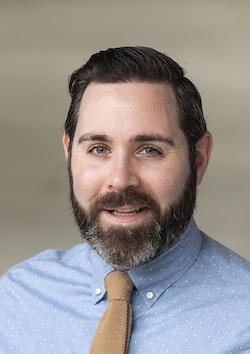
Auerbach, an assistant professor in the Department of Statistics, is working on the project “A Scientific Framework for Evaluating America’s Data Infrastructure” with a number of partners. His research covers a wide range of topics at the intersection of statistics and public policy. For this work, the team is developing a scientific framework for evaluating the health of data infrastructure.
“Our research unifies an extensive literature describing how data should be collected and disseminated—for example, the U.S. Statistical Policy Directives,” Auerbach wrote. “Our goal is to measure the extent to which these ideals are obtained in practice. Our measurements will be reported in an annual report on the State of the U.S. Data Infrastructure.”
Working with Auerbach are Claire McKay Bowen, statistical methods group lead, Urban Institute; Constance Citro, senior scholar and former director, National Academies Committee on National Statistics; Steve Pierson, director of science policy, American Statistical Association; and Nancy Potok, Urban Institute Fellow and former chief statistician of the United States.
Jiasun Li
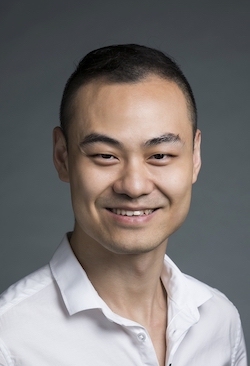
For the project “Organizing an Efficient and Inclusive Digital Economy: The Roles of Recent Technological Breakthroughs in Verifiable Computation,” Li, associate professor in the Costello College of Business, is partnering with Protocol Labs, one of the industry pioneers in verifiable computation algorithms.
Li said that Protocol Labs shares his research interests in modeling the underlying economics of different business models for providing digital services, as well as exploring the potential of various verifiable computation algorithms in ensuring an efficient, inclusive, and sustainable digital future. Li hopes that this collaboration will not only facilitate knowledge transfer but also open up many new research frontiers at the cross-section of business, economics, and computer science, he said.
Emanuela Marasco
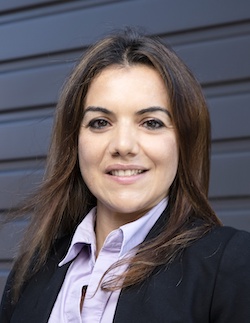
Marasco, an assistant professor in Mason’s Department of Information Sciences and Technology, is partnering with Karl Ricanek, founder of Lapetus Solutions Inc. and a computer science professor from University of North Carolina-Wilmington, on the project “Video-based, Secure, Accurate and Usable Contactless Fingerprint Authentication in Smartphones.” Marasco’s research focuses on the need for further device security to protect sensitive data due to the rapid growth and increased accessibility of smartphones.
“Finger photo recognition represents a promising touchless technology that offers portable and hygienic authentication solutions in smartphones, eliminating physical contact,” said Marasco. “Exploiting video data holds great potential for mitigating these issues since more information is available to be analyzed by the system.”
Parth Pathak
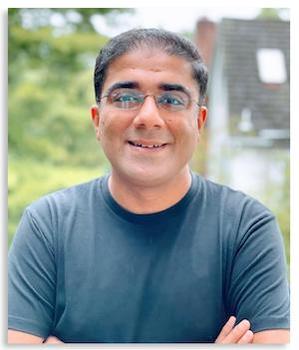
Pathak, an associate professor in Mason’s Department of Computer Science, is working with AT&T Labs on “Predicting RF Exposure in Today’s Ultra-dense Wireless Networks.” The aim of this project is to develop a novel framework for Radio Frequency (RF) exposure prediction, which embeds the environment information (e.g., 3D maps of buildings) directly into the ray tracing process using deep learning.
With a close collaboration with AT&T Labs, the models will be developed using large-scale datasets from operational networks. The project has the potential to reduce the cost of wireless network deployment and operations, making them more affordable and curbing the digital divide.
Kun Sun
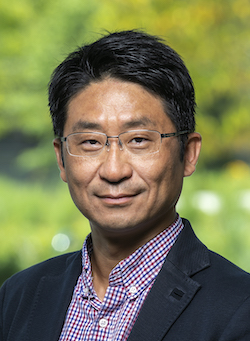
Sun, a professor in the Department of Information Sciences and Technology, is working with Yan Zhai, senior director of cybersecurity at Visa Inc. on the project “Reference-based Automatic Program Repair.” Sun’s proposed research activities aim to constitute digital innovation for good by improving the quality, security, and reliability of software systems used in various industries, including health care, finance, and transportation. This research includes implementing a new automatic program repair (APR) technique that will target software bugs. Conducting this research alongside Sun are a number of Mason graduate students.
In addition to Zhai providing input and feedback to the Mason team, Visa Inc. has given $50,000 to support the research as well as two summer internships for Mason students.
Craig Yu
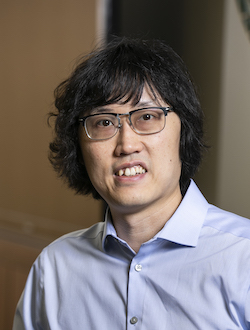
Yu, an associate professor in Mason’s Department of Computer Science and director of the Design Computing and Extended Reality (DCXR) lab at Mason Square, is working with a number of partners on his “Advancing Human-Machine and Human-Human Collaborations via Networked Extended Reality Innovations” project. His research aims to inform the emerging extended reality (XR) technologies industry as well as the U.S. government on strategic investments and future standards on telecommunication infrastructures.
Yu’s collaborators include Simon Su, a computer scientist at the National Institute of Standards and Technology; Cuong Nguyen, a research scientist at Adobe Creative Intelligence Lab; Kafi Hassan, a principal technology development strategist at Advanced and Emerging Technology Group of T-Mobile USA; Hsueh-Cheng (Nick) Wang, associate professor at National Yang Ming Chiao Tung University; Brendan David-John, an assistant professor in Virginia Tech’s computer science department; and Christos Mousas, an associate professor at Purdue University’s department of computer graphics technology. Lastly, Yu is also working with Carley B. Fisher-Maltese from Mason’s School of Education and Andrew Garavito, beekeeper of Mason’s apiary in charge of the Honey Bee Initiative, to create a VR-teleoperated beehive.
